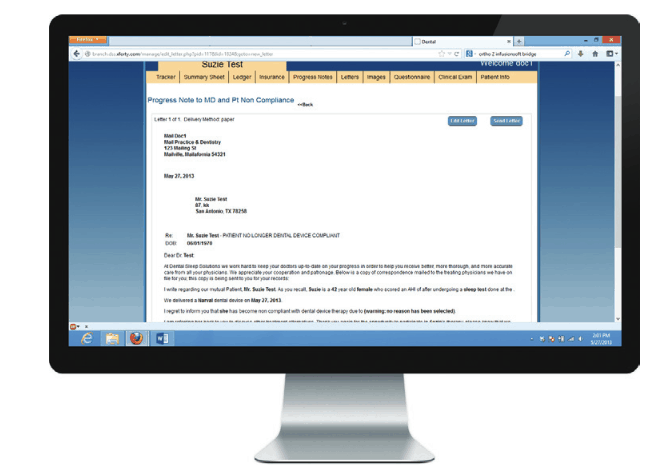by Brandie Havell
Most proficient and prolific dental sleep medicine (DSM) practices utilize a dedicated DSM software. Why is this and what criteria should you evaluate when considering adoption of a DSM software?
Based on a combination of formal surveys and informal feedback from nearly 100 dentists, it can be summarized that the appeal lies in the added efficiency, separation of dental and medical charts, as well as medico-legal and payer compliance.
Steve Green, DDS, of Fishers, IN stated that “my DSM software ensures that records are accurate, correspondence with physicians is generated and digitally faxed, and exams are just much easier than using my practice management software. Plus, it’s important to keep my DSM records separate from my restorative records.”
Gy Yatros, DMD, co-founder of the DS3 software agrees. “We are experiencing an increasing number of dentists that aim to transition from restorative dentistry to only treating DSM patients. A dedicated DSM software empowers dentists to get a valuation of their restorative practice while separating DSM production. When they sell, their DSM practice travels with them in their DS3 software.”
Another important consideration involves medical insurance. Oral Appliance Therapy is typically a covered medical benefit. When billing medical insurance, there is exposure to the possibility of a payer audit. Most practices are uncertain about this process and the right DSM software can help safeguard them in the event they are audited. Some DSM software products allow practices to mitigate risk and eliminate the need to share restorative patient information with auditors.
One should also consider ease of use and how robust the platform is. Several survey respondents noted their software was difficult to navigate which ultimately resulted in under-utilization. Others noted that they switched from one DSM software to another because they needed a tool with expanded functionality such as connecting with their biller, ordering home sleep tests, transmitting lab cases, and connecting with their practice management software.
Lastly, but ranking high among survey respondents was the importance of training and continual support. Many surveyed stated that they purchased antiquated software and received minimal training. This left many feeling buyer’s remorse about their decision while others exclaimed that their choice’s ongoing support has been worth the cost of their subscription.
There are several DSM software tools available and numerous considerations when shopping. Contact the companies, ask your peers, seek testimonials, and request a demo to ensure that you make the right choice for your practice.

For more ways of effective record keeping with DSM software and practice development tips, read Dr. Warren Schlott’s article, “The Changing World of Dental Sleep Medicine”.